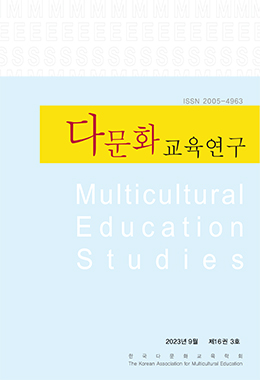현대 한국 사회는 다문화사회로 변모하고 있다. 미래 사회에 다문화 학생을 인재로 육성하기 위해서는 한국어 교육에만 중점을 두는 것이 아닌 다문화 학생이 가진 언어적 능력을 활용하며 미래 사회에 필요한 역량을 함양할 수 있는 수업 개발이 필요하다. 이를 위해 본 연구는 다문화 학생의 언어적 강점을 활용한 이중언어 활용 교과수업을 통해 어떠한 인지적·기능적·정의적 변화가 있는지 살펴보고, 다문화 학생들에게 의미 있는 교수·학습에 대한 시사점을 탐구하는 것을 목적으로 한다.
본 연구의 결과는 다음과 같다. 첫째, 연구대상자들은 이중언어를 활용한 교과 수업을 실시한 결과, 인지적 측면에서 한국어 사용능력과 교과 이해 능력에 의미있는 변화 모습이 나타났다. 둘째, 교과 이해 능력 뿐 만 아니라, 한국어를 이해하고 사용하는 능력이 향상되었다. 셋째, 연구대상자들은 이중언어를 활용한 교과수업을 통해 자신이 수업을 이해하는 정도를 분명히 파악하였고 학습에 대한 자신감과 자기효능감이 향상되는 등 정의적 측면에서의 성과가 있었다. 이중언어를 활용한 교과수업은 다문화 학생의 언어적 강점을 활용한 수업으로, 한국어를 학습하는데 집중되어 있는 기존의 다문화교육에서 벗어나 새로운 다문화교육의 방향을 모색하는데 의의가 있다.
Social change and technological development are rapidly taking place. In order for meaningful education to take place in the future society, it is necessary to develop classes that can foster the capabilities necessary for the future society by utilizing the linguistic abilities of multicultural students, not just focusing on Korean language education. The purpose of this study is to examine the cognitive, functional, and emotional changes through bilingual curriculum using the linguistic strengths of multicultural students and to explore implications for teaching and learning that are meaningful for multicultural students. The results of this study are as follows. First, as a result of conducting bilingual subject classes, the subjects showed significant changes in their ability to use Korean and understand the subject in terms of cognition. Second, the ability to understand and use Korean has improved. Third, the subjects clearly identified their understanding of the class through bilingual subject classes and achieved positive results, such as improving their confidence in learning and self-efficacy.




